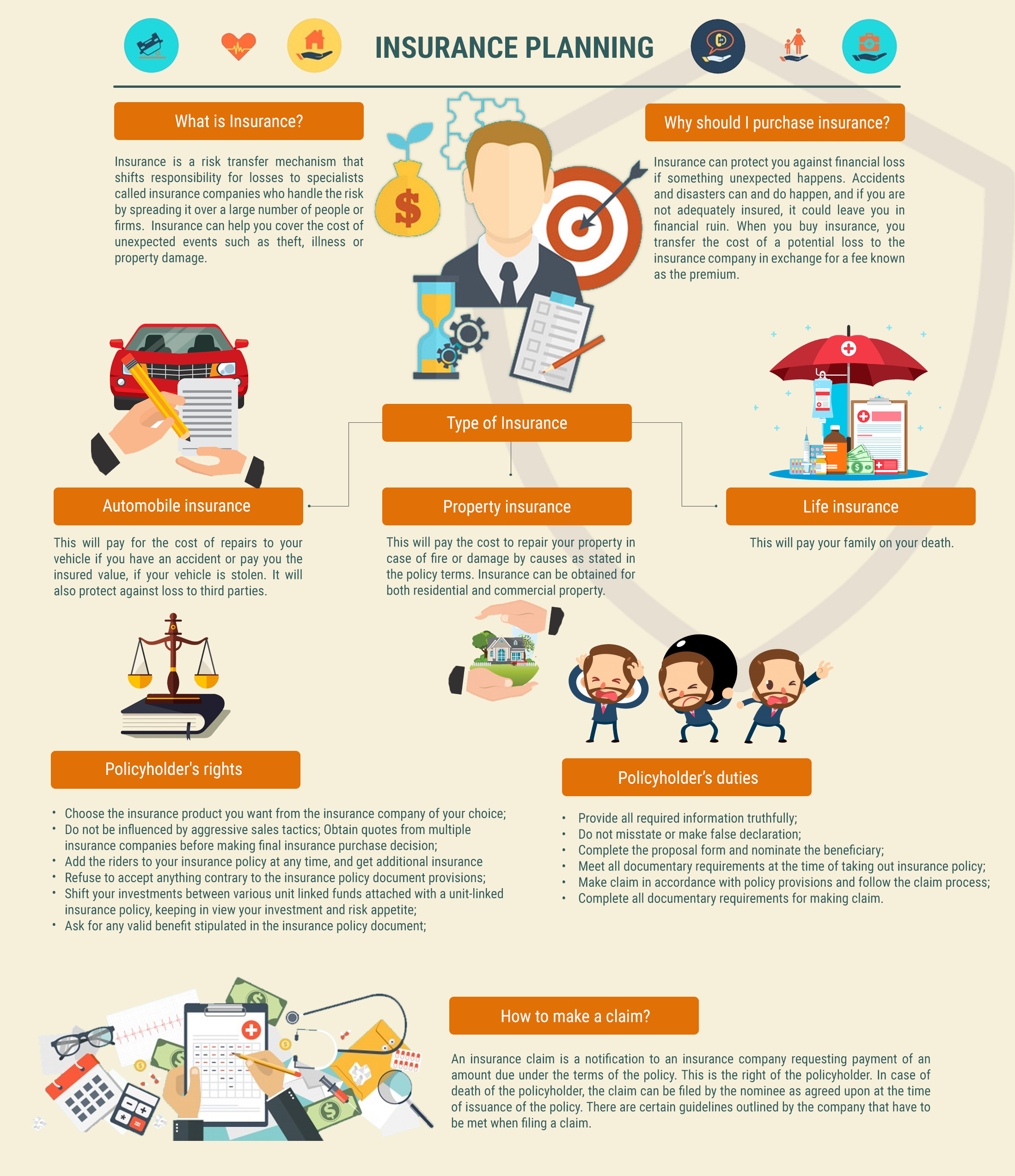Some of us may believe that we have enough money to replace our assets should anything happen to them. However, the problem is that in most cases, the expenses incurred after an accident, or a disability or the death of a loved one may exceed any savings or wealth that we may have accumulated. It is for this reason that insurance is an important component of financial planning.
Purchasing insurance cover is indeed more economical in the long-term than having to use your hard-earned savings to pay for the loss or damage of assets, especially when it is a costly expense.

What is insurance?
Insurance is a risk transfer mechanism that shifts responsibility for losses to specialists called insurance companies who handle the risk by spreading it over a large number of people or firms. Insurance can help you cover the cost of unexpected events such as theft, illness or property damage. If you purchase insurance for any of your assets, the insurance company will pay you an amount equal to the value of the asset that has been lost. You can also purchase life insurance to protect your loved ones on your death.
Why should I purchase insurance?
Insurance can protect you against financial loss if something unexpected happens. Accidents and disasters can and do happen, and if you are not adequately insured, it could leave you in financial ruin. When you buy insurance, you transfer the cost of a potential loss to the insurance company in exchange for a fee known as the premium. Insurance companies invest the funds securely, so they can grow, and can be used to pay claims as they arise. The decision to get insurance will depend on your circumstances and your stage in life. Examples of insurance protection include:
- Automobile insurance: This will pay for the cost of repairs to your vehicle if you have an accident or pay you the insured value, if your vehicle is stolen. It will also protect against loss to third parties.
- Life insurance: This will pay your family on your death.
- Property insurance: This will pay the cost to repair your property in case of fire or damage by causes as stated in the policy terms. Insurance can be obtained for both residential and commercial property.
Types of insurance
Insurance can be broadly classified into conventional insurance and Takaful, also called Islamic insurance. Takaful is the Islamic alternative to conventional insurance and is designed to be Shariah compliant. Both conventional and Takaful offer the same insurance types and products. Some of the most common types of insurance policies offered include:
Motor insurance
There are two basic types of motor/auto insurance coverage
Third Party Liability: Third party coverage protects the policyholder against liabilities incurred to third parties in the event of an accident such as property damage, bodily injury or death. In Pakistan, purchase of third party insurance is mandatory for all vehicle owners.
Comprehensive: This is the widest form of coverage. You are protected against financial losses from an accidental loss to vehicle, theft, and third party liability claims because of an accident.
Premium rates depend on several factors that may include:
- Make and model year of car
- Purpose of vehicle use, private vs. commercial
- Tracker installed and geographical location where car will be used
You can reduce your premiums by agreeing to take on more risk by increasing the deductible amount. This means self-insuring the increase in the deductible amount.
Tips for buying automobile insurance
Here are some important points to keep in mind.
- When purchasing a new or used car you must buy insurance cover. Please note that insurance cover of the previous owner becomes invalid on the sale of the vehicle.
- The insured value or sum insured depends on the market value of the vehicle. The maximum compensation you will receive is the market value of the vehicle.
- Over insurance occurs, if the sum insured is greater than the market value of the vehicle.
- Under- insurance occurs, if the sum insured is less than the market value; you are self-insuring the difference, and will only be partially compensated. For example, if you have insured your vehicle up to 70% of the market value, the insurance company will only pay 70% of the total repair cost.
Life insurance
Life insurance is protection against financial loss from death. The named beneficiary receives the proceeds, and is protected from the financial impact of the death of the insured. The death benefit is paid by a life insurer in consideration for premium payments made by the insured.
Life insurance can offer a combination of protection and saving components, and the proportion of these components in an insurance product may vary depending on the product type and consumer needs and preferences. An insurance product may have variable proportions of protection and savings, which under certain life insurance products can be chosen by the policyholder.
Getting insured – how to go about it?
Your first step is to contact an insurance company. List of insurance companies registered with SECP is available at the following link: https://www.secp.gov.pk/document/list-of-insurance-companies-2/?wpdmdl=20074.
You may contact the insurance company through telephone, email or by visiting the branch. It is highly recommended that you ask all the questions, when the insurance agent/ sales person visits you to provide information about the insurance policy. You should clear any confusion that you may have about the insurance product.
Before you are insured, the insurance company will carry out a need assessment to see which insurance policy is most suitable for you. The company will determine the likelihood of the occurrence of a loss and estimate the amount of the loss. These will be used to determine the level of premium you have to pay, and to see if you qualify for an insurance policy in the first place. This process may require an examination of your driving history, credit history, health records, etc. depending on the type of policy you are purchasing. Once you have qualified for insurance and your policy features – premiums, payment schedule, and terms of payment are finalized- a policy contract will be prepared under your name.
It is always advisable to compare the premium that the insurance company is proposing to charge with that of other insurers. The most reliable way of comparing prices is by speaking to agents of different companies and obtaining quotes.
Important
You must read and thoroughly understand all the terms and conditions of the policy contract before signing it. If there is anything you do not understand, get clarity from your insurance agent, or directly from the insurance company, and be thoroughly satisfied that you have understood all aspects of your policy. You should especially look out for what will be covered, under what circumstances, and the procedures for making claims.
Policyholder's duties and rights
As an insurance policyholder, you have certain duties and rights as under:
Policyholder’s duties
- Provide all required information truthfully;
- Do not misstate or make false declaration;
- Complete the proposal form and nominate the beneficiary;
- Meet all documentary requirements at the time of taking out insurance policy;
- Make claim in accordance with policy provisions and follow the claim process; and
- Complete all documentary requirements for making claim.
Policyholder's rights
- Choose the insurance product you want from the insurance company of your choice; Do not be influenced by aggressive sales tactics;
- Obtain quotes from multiple insurance companies before making final insurance purchase decision;
- Add the riders to your insurance policy at any time, and get additional insurance coverage;
- Refuse to accept anything contrary to the insurance policy document provisions;
- Shift your investments between various unit linked funds attached with a unit-linked insurance policy, keeping in view your investment and risk appetite;
- Ask for any valid benefit stipulated in the insurance policy document;
- Ask the insurance company to act in accordance with the written terms and conditions of the insurance policy;
- Lodge complaint with the designated dispute resolution forum regarding maladministration of the insurance company or its representative or agent; and
- Surrender the cash value policy at any time and obtain underlying amount of the insurance policy.
How to make a claim?
An insurance claim is a notification to an insurance company requesting payment of an amount due under the terms of the policy. This is the right of the policyholder. In case of death of the policyholder, the claim can be filed by the nominee as agreed upon at the time of issuance of the policy. There are certain guidelines outlined by the company that has to be met when filing a claim.
Here are some important points you should note:
- The policyholder should obtain the contact details of the claims department of the insurance company at the time of buying the insurance policy
- The policyholder should educate the beneficiary of the policy about the benefits to which he/she is entitled on the occurrence of death or other insured events
- In case of non-death claim, the policyholder has to contact the claims department of the insurance company as soon as the loss is incurred. In the event of death of the insured, the nominee of the policy has to make the claim
- If certain time limit for making claims is specified in the insurance policy terms and conditions, the policyholder is bound to make claim within that specified time limit. Nevertheless, it is in the best interest of the policyholder to file the claim with the insurance company as soon as possible.
- Policyholder must make claim in writing if explicitly required by policy terms.
- The insurance company will require certain documents related to claim processing. It is the responsibility of the policyholder to provide all documents as required in writing by the insurance company.
We have provided you with a brief introduction to insurance. For a more detailed discussion please read our insurance guide at the following link:
https://jamapunji.pk/sites/default/files/Insurance%20Basic%202017_0.pdf
Insurance companies contact information
List of insurance companies registered with SECP is available at the following link:
https://www.secp.gov.pk/document/list-of-insurance-companies-2/?wpdmdl=20074.





